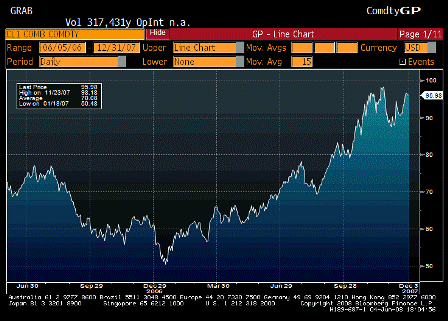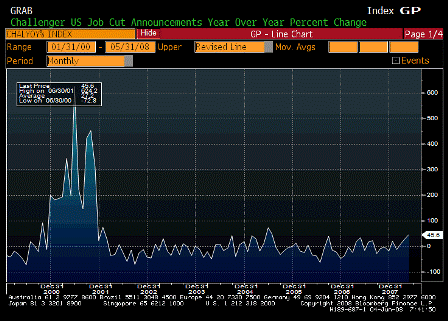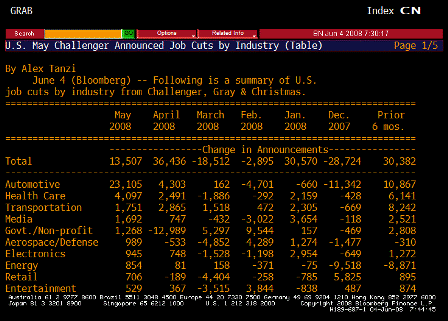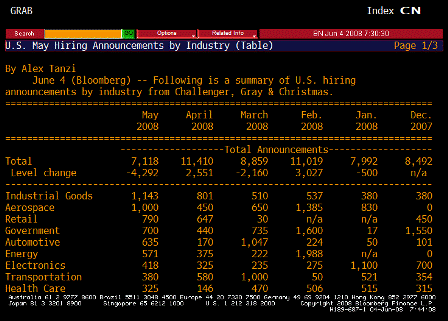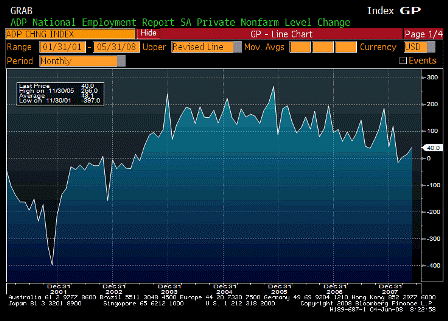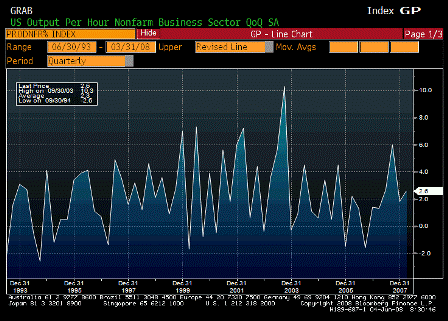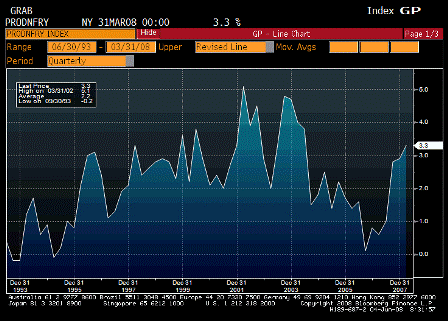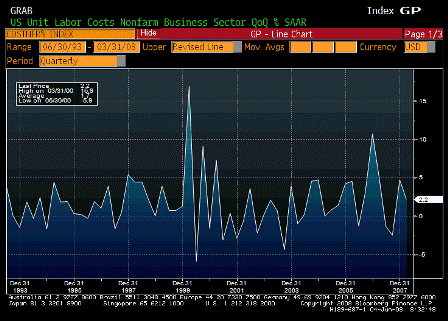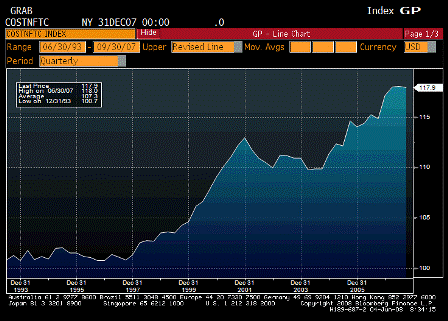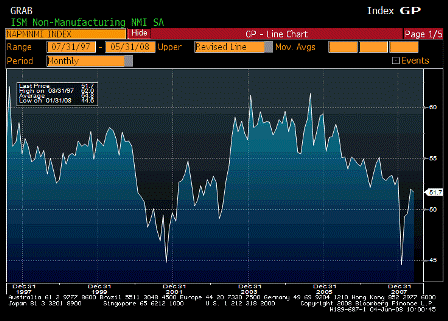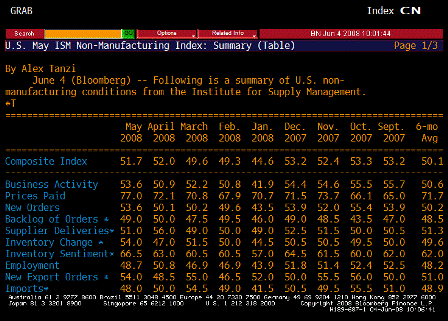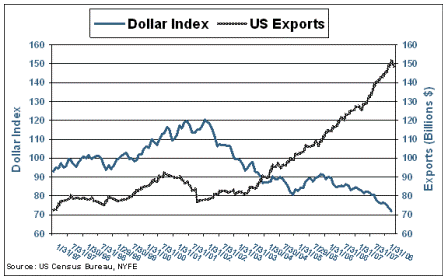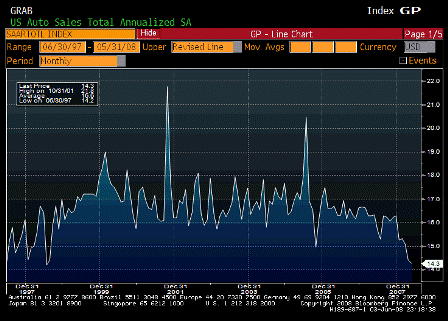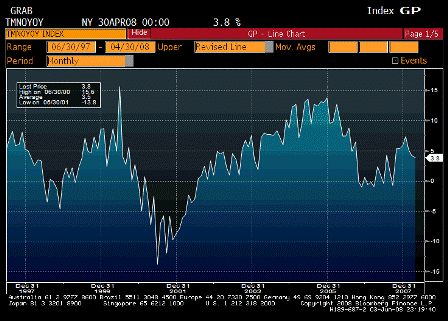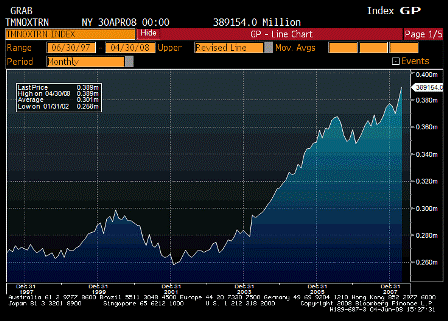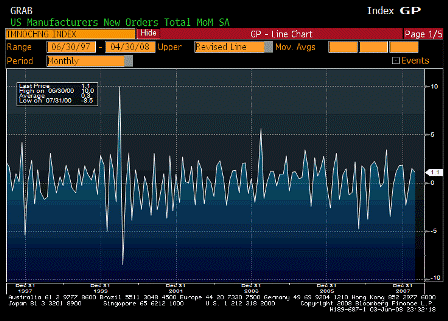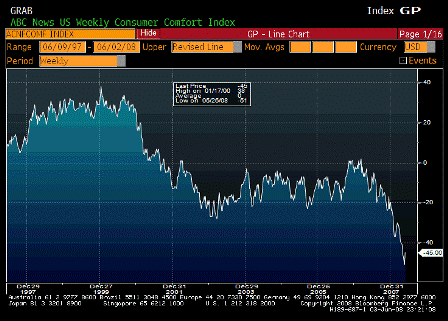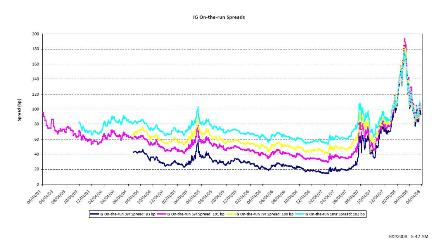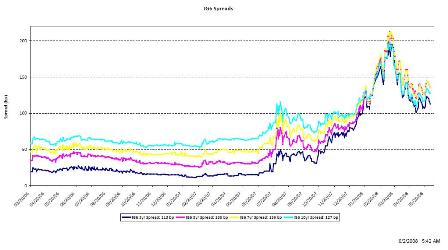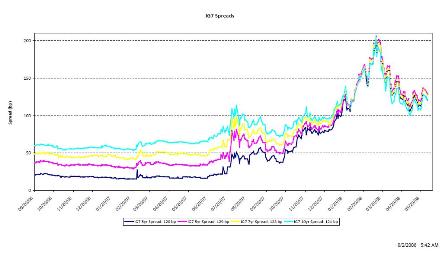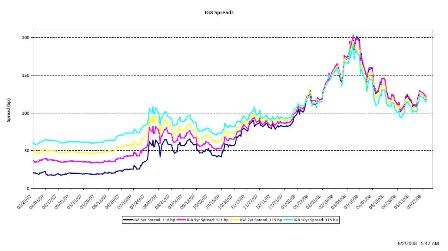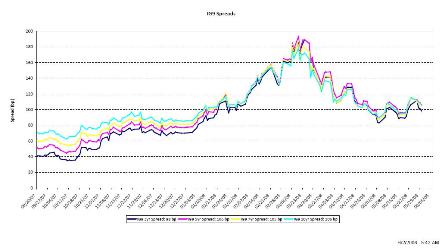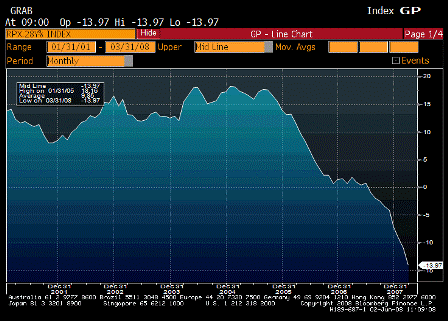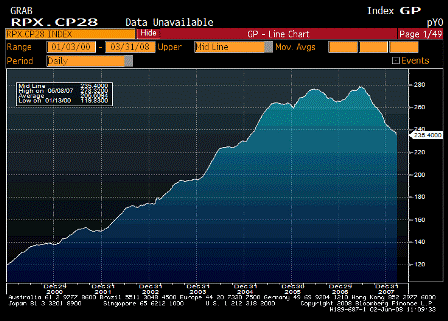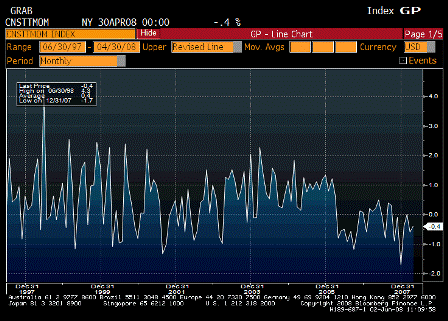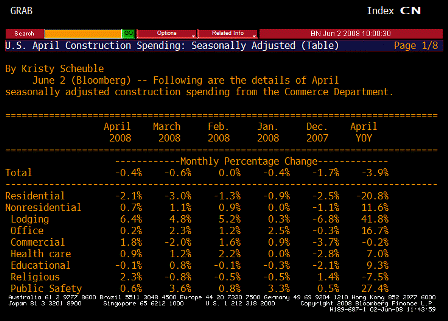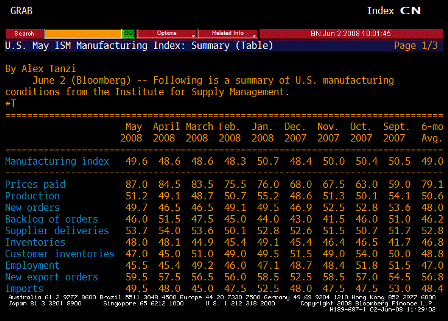[Skip to the end]
by James Pethokoukis
Douglas Holtz-Eakin is the director of economic policy for Sen. John McCain’s presidential campaign. He’s also a former director of the Congressional Budget Office. I recently caught up with Holtz-Eakin at McCain campaign headquarters and chatted with him a bit about taxes, the size of government, and energy policy. (To get his take on Clintonomics and the 1990s, see this.) Here are some excerpts:
Are we headed toward bigger government?
Senator McCain’s position is that there is a role for government, and the primary thing is that you identify government’s role and make sure that it does it well. The striking thing that has come out of the campaign is the degree to which the American people have lost trust in their government to pursue genuine national priorities, and there are three instances in which this gets voiced pretty clearly; probably the most vivid is the immigration debate, where people simply did not believe that the federal government [would secure the borders]…so Senator McCain made it his commitment that he will secure the border and have the governors of the border states certify that it is secure before any other steps on immigration are taken….
If we promote domestic demand in Mexico and full-employment, they will build a wall to keep us out.
And earmarks have led to the undeniable perception that Congress is interested in taking care of their friends and not the nation, and [earmarks] have led to political corruption and in some cases criminal corruption. And the third is trade…where the perception is that trade deals are no better than earmarks, and that is really troubling and you have to fix that before you do anything else as far as getting the government’s role in the economy correct. [People] want it to work, they really do.
Financial regulation would seem to be one area where government needs to work better.
I don’t think there is any sensible observer of our regulatory system that says this is how you would do it if you drew it up from scratch…. Neither is there a sensible observer who would say, “Look, there is no role for regulation.” So that debate is an artificial one. The real question is what will be effective regulation of financial markets going forward…. Senator McCain is a very practical person and he likes to get things done, and so his approach, for example, on the mortgage crisis has been fundamentally pragmatic: Let’s target the assistance…. You don’t want to have some poor American taxpayer reach into their pocket and help someone who was just flipping houses in California…. And when we do this, let’s do it in a way that helps us not return here again. And both lenders and borrowers should have to give up a little bit to get some taxpayer help…. I like to think that the debate has come where he is. People are saying “no broad bailouts.” He said that a long time ago.
If we sustain domestic demand with fiscal policy, income is stabilized which supports housing and all other economic endeavors.
How does the state of the budget look to you?
If you look at the last full fiscal year, close the books on 2007, we raised 18.8 percent of GDP in [tax revenue] and spent a bit more than that, and we ran a modest deficit by postwar standards….
Yes, not nearly enough to sustain a reasonably small output gap. That’s what started softening demand back in 2006 – the budget deficit got too small.
You roll the clock forward and you see the spending part of the budget explode, real pressures,
Define ‘pressures’? Political pressure from those who don’t understand fiscal policy is about getting effective demand right and not ‘balancing the budget’.
and there is no way you can tax enough to meet those pressuresâ€â€Â
The only pressure taxing generally addresses is inflation, and he never mentions that ‘pressure’.
It’s about inflation, not solvency. (See below)
and if you tried, you would do such harm to the economy that it would ultimately fail.
Yes, a deficit of maybe 5% of GDP is probably ‘neutral’ over time given current institutional arrangements, though for any given time frame it may be appropriate to run a larger or smaller deficit.
So the right approach is to take a comprehensive look at the spending commitments, undertake reforms in healthcare to slow the growth of Medicare,
Why? Do we want to reduce support for senior health care? No, he’s afraid of government solvency, as below:
commit to solving the Social Security [solvency problem],
THERE IS NO SOLVENCY PROBLEM.
That’s inapplicable with non-convertible currency and floating fx.
(US government checks don’t ever bounce, etc.)
which is a political problem more than anything else, deal with nondefense discretionary spending. That’s the recipe…. Let’s commit to getting the economy growing, and the revenue will be there.
This implies that revenues (from taxing or borrowing) are a precondition for spending. That is not the case with our non-convertible floating fx currency.
In fact, government is best thought of as spending first and then collecting taxes or borrowing. It’s the funds that the government spends that are used to pay taxes and buy government securities (where else can they come from???).
A close look at monetary operations tell you the same. For example, when the treasury borrows or collects tax payments and builds its balances at the Fed, the Fed has to do repos and add that amount to the banking system. Every ‘reserve drain’ requires a ‘reserve add’. The Fed calls this ‘offsetting operating factors’.
This is not a revenue problem; this is a spending problem.
If anything, it’s an inflation problem, but, again, he never mentions that.
How will you balance spending and the tax cuts Senator McCain has proposed?
It’s not that complicated…. He wants to repeal the [alternative minimum tax]. That’s about $60 billion in additional revenue losses. Fine. We have $60 billion in discretionary spending that was sourced to earmarks. He believes that should go away…. The one that is going to be getting attention is if we cut the corporate income tax from 35 percent to 25 percentâ€â€Âwhich is a competitiveness mustâ€â€Âyou, in some static sense, lose $100 billion a year ballpark. That’s real. But you can broaden the base. There are $30 billion a year in rifle shots that you should go after. You can count on some economic feedback, some 30 percent. So that gets you to $60 billion. So the net loss is $40 billion, and we think we can get 40 more in spending.
How about just letting the deficit go up with domestic demand as weak as it is?
The only reason not to be inflation, again, never mentioned.
How would a President McCain make Social Security solvent?
He believes it can be fixed without raising taxes….
That is, he believes, it has a solvency problem as he previously stated.
If you just do [indexing benefits to prices rather than wages] you can fix it over the long haul,
Yes, you can cut promised benefits. That’s a political choice. Government spending is not constrained by revenues. It may be constrained by inflation, again, never mentioned.
and he is perfectly willing to have personal accounts be part of this as long as they are not a substitute for fixing the basic challenges facing the system. When he becomes president, he will ask Congress to do it. He will send them a bill, up-or-down vote, let’s go.
Personal accounts are a ‘wheel spin’. At the macro level, they substitute government bonds for social security ‘investments’ and nothing more, apart from a lot of wasteful transaction fees.
What would his approach to tax reform be?
Look at our current tax code, and the striking number is the one that came out of the president’s tax reform panel. Take a comprehensive measure of the costs of administration, compliance, and economic distortionsâ€â€Âit’s $140 billion a year. That is a seriously large number, just wasteful.
And way understated. I estimate true compliance costs of the income tax system at over $1 trillion.
So the first step is, the current tax code is a disaster. And what we want to do is keep taxes low because we are raising enough revenue,
Taxes are about removing aggregate demand to ‘make room’ for government spending, not raising revenue.
and they have to be fairer and simpler.
More to the point is the distribution of consumption, yet another key issue never even mentioned.
So, we said, let’s get rid of the AMT because it’s starting to hit the middle class…. And let’s make sure it is pro-growth
Doesn’t say how getting rid of the amt is pro-growth. If government cuts spending as he indicates, aggregate demand will fall by at least the marginal propensity to ‘save’ of those with lower taxes, for example.
and competitive….
What does ‘competitive’ mean in this context? Somehow add to exports which is also a flawed concept?
In 2000, he ran on a march to a flat tax, from the bottom up, and that signals how simple he would like things to be if he could get there.
Interesting stringing together of rhetoric, seems to say simplifying the system rather than addressing the questions of distribution of consumption has priority.
Why is getting rid of budgetary earmarks important?
The earmarks are not about the numbers; they are about the message you are sending to the American people. You cannot go to the American people and [cut spending] when they believe someone else is getting theirs on the side. If you want to deal with entitlements and the broader spending problems, you need to get the high ground.
Hillary Clinton says she can manage the economy better than McCain. Can any president really manage our $13 trillion economy?
No one should try. It’s a bit of a cheap shot, but I can’t bring myself to not say it: The last ones who tried this were the Russians. You don’t manage economies. You just don’t because you can’t. The key is to have some principle, to have a rudder that says, “This is something the private sector does, and here is the framework in which they should do it.
Yes, markets work only within institutional structure. That’s why they need to manage.
Go….” But the government has to do defense, the government has to take care of poor people, it has to step in during emergencies and have an effective responseâ€â€Âthose are places where we belong, and we have to be able to manage that because it sends confidence that we can then go get the other stuff right.
What is the key to dealing with healthcare?
The fundamental problem with healthcare is rising costs.
Empty rhetoric. Doctors are getting less and less, hospitals are running lean, particularly with service staffs.
The focus on the Democratic side is covering everybody. That’s a laudable goal, but the reality is even if you were to snap your fingers and cover everybody who was uninsured … and in exchange for their insurance you had them pony up $3,000 apiece, you would raise $150 billion, which is a lot of money, and now everyone would be in the system and given 6 to 8 percent cost growth a year, you would chew up that $150 billion within a year, and now everybody is in and it’s getting more and more expensive every year and that is why companies drop insurance and people can’t buy insurance. The Democratic formulation solves the wrong priority first.
Totally misses the point.
It’s about the amount of real resources we want to direct at healthcare: doctors, buildings, research, nurses, supplies, drugs, etc, etc.
There are a finite amount of ‘workers’ and infinite wants. So, for example, more people in health care might mean fewer people on Wall Street, fewer real estate agents, etc. Those are the tough decisions…
McCain favors a cap-and-trade system to deal with carbon emissions rather than a carbon tax. Former Bush economist Greg Mankiw says a carbon tax would be far simpler and transparent. Any thoughts on this?
The carbon tax is never going to look like anything that Greg Mankiw draws up in his blog. It will be a real-world carbon tax, which will have the same complexities and issues that a cap-and-trade system does. So the issue is which real-world policy, which will never look as clean as it does on a blackboard, will be effective. The senator is quite convinced that to bring the broad environmental community on board, cap-and-trade is the most effective way…. And there is international experience with it, which is important since this is fundamentally a global problem. So the realities dictate that cap-and-trade is probably the most fruitful approach. But point No. 2 is that you have to do something. We can’t spend $400 billion a year on imported oil and finance Hugo Chávez…so let’s get serious. And the most serious way to do something is to in fact innovate, but the only way we innovate is if there are market incentives to innovate, and that is exactly what cap-and-trade produces.
Allocating by price – there are other alternatives to reduce consumption that never get discusses. Dropping the national speed limit to 30 MPH is just one example.
Bottom line: both parties are all ‘budget balancers’ that will most likely continue to deliver a substantially sub-optimal economic outcome.
[top]

